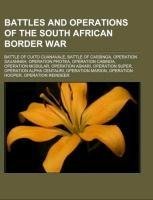
-
 Anglický jazyk
Anglický jazyk
Battles and operations of the South African Border War
Autor: Source: Wikipedia
Source: Wikipedia. Pages: 24. Chapters: Battle of Cuito Cuanavale, Battle of Cassinga, Operation Savannah, Operation Protea, Operation Cabinda, Operation Modular, Operation Askari, Operation Super, Operation Alpha Centauri, Operation Marion, Operation Hooper,... Viac o knihe
Na objednávku
12.69 €
bežná cena: 14.10 €
O knihe
Source: Wikipedia. Pages: 24. Chapters: Battle of Cuito Cuanavale, Battle of Cassinga, Operation Savannah, Operation Protea, Operation Cabinda, Operation Modular, Operation Askari, Operation Super, Operation Alpha Centauri, Operation Marion, Operation Hooper, Operation Reindeer, Operation Daisy, List of operations of the South African Border War, Operation Packer, Operation Seiljag, Operation Bruilof, Operation Wallpaper, Operation Safraan, Operation Sceptic, Operation Displace, Operation Rekstok, Operation Klipklop, Operation Prone. Excerpt: The Battle of Cuito Cuanavale in 1987/88 was an important episode in the Angolan Civil War (1975 to 2002). Between 9 September and 7 October 1987, the Angolan Army (FAPLA), in an attempt to finally subdue the Angolan insurgent movement UNITA in south-eastern Angola, was decisively repelled in a series of battles at the Lomba River between by the South African Army (SADF), which had once more intervened on UNITA's behalf. With FAPLA retreating to their starting point at Cuito Cuanavale, the SADF and UNITA went on the offensive and started the siege by shelling Cuito with long-range artillery on 14 October. A major battle ensued and Angola, fearing a defeat, requested help from Cuba. With Cuban enforcements Cuito was held and the South African advance ended after six unsuccessful attempts to overcome the FAPLA-Cuban defences between 13 January and 23 March 1988. The SADF retreated but continued to shell Cuito from a distance. For 13 years until 1974, three armed groups fought for Angola's independence from Portugal: the leftist MPLA (with its armed wing FAPLA), led by Agostinho Neto; the conservative FNLA, led by Holden Roberto and supported by Mobutu Sese Seko of Zaïre; and UNITA, led by Jonas Savimbi (a former Maoist who broke away from the FNLA, later sponsored by the CIA and South Africa). After the Carnation Revolution of April 1974 in Portugal, the new revolutionary government of Portugal let go of Portugal's African overseas possessions, including Angola. The Treaty of Alvor comprised a series of agreements between the three rebel factions and Portugal that were to pave the way to independence. Under its terms, a transitional government was formed, elections were scheduled for the end of the year, and 11 November 1975 was slated as Angola's independence day. Fighting between the three rebel factions started soon after the transitional government took office on 31 January 1975, with each movement gaining control of their traditional areas of influence by mid-197
- Vydavateľstvo: Books LLC, Reference Series
- Rok vydania: 2014
- Formát: Paperback
- Rozmer: 246 x 189 mm
- Jazyk: Anglický jazyk
- ISBN: 9781155325651






 Ruský jazyk
Ruský jazyk 





